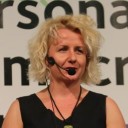Do you think that technology is for geeks and specialised tech organizations? Let me present to you a few examples from the conference ‘Technology for Social Good’, showing that no matter what your field of expertise, technology can help to increase the impact of your work.
The conference was organised by TechSoup Europe Network in cooperation with Assifero, DAFNE, Reves and the Iris Network and hosted by the EESC. The TechSoup Network in Europe consists of 28 non-profit capacity building organizations across 44 countries, supporting 23 languages and serving a network of over 250,000 registered non-profit organizations. Next to running the largest technology philanthropy programmes in Europe (donations worth over €914m) the Network is also catalysing community-oriented technology innovations.
One example of our network activity is an on-line incubator for young entrepreneurs run by the Mozaik Foundation in Bosnia and Herzegovina. Vesna Bajšanski-Agić, of TechSoup Balkans, explained that an on-line e-learning platform proved to be the cheapest and most effective way to reach young people from rural areas from all over the country. It wasn’t used to replace direct communication with clients, but to better allocate the limited resources for direct support. Technological tools helped to reach a mass audience and to select the people most in need of personal coaching.
Médéric Jacottin, of Emmaus France, spoke of the risk they took investing several million Euros into building an online platform to transform their way of work on income-generating activities at local level with people who have experienced social exclusion. The new tool will expand the services offered by Emmaus, and increase the efficiency of daily operations. Moreover, it will provide the board with new data, useful for strategic analysis and decision-making.
This is the kind of transformation that every traditional non-profit will sooner or later face, in order to stay effective. It requires investments. How many of us are ready to support investments that can have a big impact but, as with every innovation, are also risky? The business sector certainly does it.
Carola Carazzone from the Italian association of grant-making foundations Assifero, emphasized the need for a more strategic approach to philanthropy and more collaboration. A perfect illustration of such a strategic approach is the initiative presented by Cariplo Foundation in Italy, which made an investment aiming to develop 10,000 job opportunities in three years. Engaging several cross-sectoral partners into collaboration is the basis for such ambitious initiatives. Supporting collaboration across sectors and connecting people from different ‘silos’ is exactly what the TechSoup network does.
You do not need to be a tech-savvy organization to contribute. The ‘Silver-geek’ project, where young volunteers facilitate digital workshops in care homes, implemented in Poitou-Charentes in France, and co-managed by TechSoup partner Les Ateliers du Bocage, shows that know-how, time, contacts, and products are equally important ingredients of success, as is software and financial inputs. This project involved several companies, public institutions, and social organizations – with everyone contributing in a different way to achieve the desired impact.
The value of bringing together people with various skills was emphasised during the conference by Clemens Frede of Stifter-helfen.de, who engages experts from corporations to share their expertise with social organizations via webinars – another example of how the TechSoup network can bridge the technological know-how gap between business and the civic sector.
Connecting tech experts from the business sector, policy-makers from public institutions, change agents from social organizations, hackers, and start-up entrepreneurs might seem like an easy recipe for social innovation. However, it’s often a big challenge to facilitate cross-sectoral cooperation, particularly in technological projects. One example of TechSoup’s experience in being a bridge-builder and translator between tech experts and social stakeholders is the Apps4Warsaw project that we have now successfully scaled in Ukraine.
The value of such projects is not only in the technological tools and applications created by the participants. The greatest benefit comes in the know-how exchange, the new ways of working, and policy developments that occur during the process of cross-sectoral cooperation. And that’s something we are always eager to cooperate on.
Anna Sienicka is vice president of TechSoup Europe.






Comments (0)